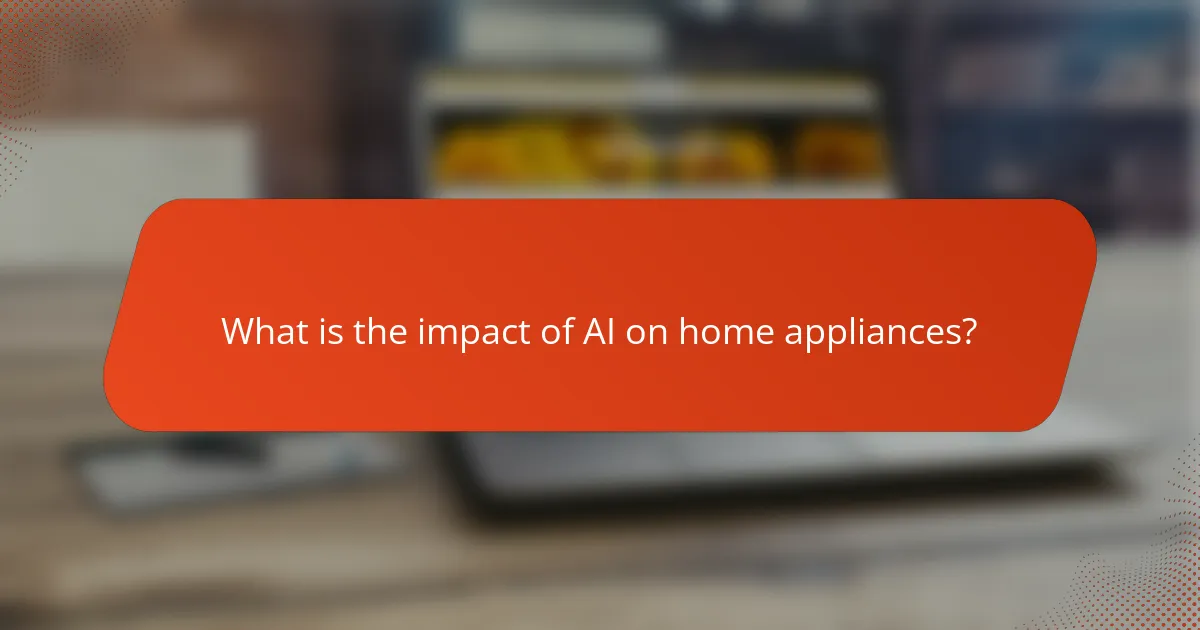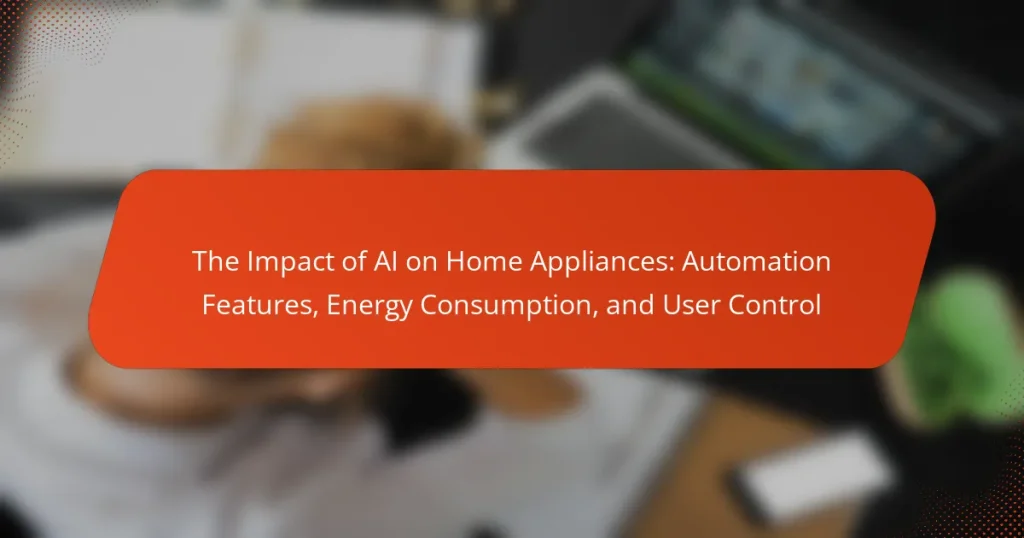Artificial Intelligence (AI) is revolutionizing home appliances by enhancing their functionality through automation, energy optimization, and improved user control. Smart devices, such as refrigerators, can autonomously track food inventory and recommend recipes, while AI algorithms learn usage patterns to reduce energy consumption and lower bills. Additionally, AI facilitates remote management of appliances via voice commands and mobile applications, significantly increasing convenience and efficiency for users. Research indicates that integrating AI into home appliances can lead to energy savings of up to 30%, highlighting the transformative impact of AI on everyday household technology.

What is the impact of AI on home appliances?
AI significantly enhances the functionality of home appliances. It enables automation, allowing devices to perform tasks with minimal human intervention. For example, smart refrigerators can track food inventory and suggest recipes. AI also optimizes energy consumption by learning usage patterns. This leads to reduced energy bills and environmental benefits. Furthermore, AI improves user control through voice commands and mobile apps. Users can remotely manage appliances, increasing convenience and efficiency. Studies show that AI integration in appliances can save up to 30% in energy costs. Overall, AI transforms home appliances into smarter, more efficient devices.
How is AI transforming the functionality of home appliances?
AI is transforming the functionality of home appliances by enhancing automation, improving energy efficiency, and increasing user control. Smart appliances utilize AI algorithms to learn user preferences and optimize their performance. For example, AI-enabled thermostats can analyze usage patterns to adjust heating and cooling automatically. This leads to significant energy savings, with some studies indicating up to 30% reduced consumption. Additionally, AI allows for remote control and monitoring through mobile applications. Users can manage appliances from anywhere, making it convenient and efficient. Overall, AI integration in home appliances significantly elevates their functionality and user experience.
What are the key automation features introduced by AI in home appliances?
Key automation features introduced by AI in home appliances include smart scheduling, adaptive learning, and remote control capabilities. Smart scheduling allows appliances to operate at optimal times based on user preferences and energy rates. Adaptive learning enables devices to understand user habits and adjust settings accordingly for enhanced efficiency. Remote control capabilities provide users with the ability to manage appliances from anywhere via smartphone apps. These features collectively improve convenience, energy management, and user experience in modern homes.
How does AI enhance user experience with smart home technology?
AI enhances user experience with smart home technology by providing automation, personalization, and improved efficiency. Smart home devices utilize AI algorithms to learn user preferences over time. This learning allows devices to anticipate needs, such as adjusting lighting and temperature automatically. AI also enables voice recognition, allowing users to control devices hands-free. Furthermore, AI systems optimize energy consumption by analyzing usage patterns. This leads to cost savings and reduced environmental impact. According to a report by Statista, the global smart home market is expected to reach $174 billion by 2025, highlighting the growing reliance on AI in home technology.
What are the implications of AI on energy consumption in home appliances?
AI significantly reduces energy consumption in home appliances. Smart appliances use AI algorithms to optimize energy use based on user habits. For example, washing machines can adjust water levels and cycle times to minimize energy waste. Refrigerators can learn to maintain optimal temperatures based on usage patterns, reducing power consumption. According to a report by the International Energy Agency, smart appliances can lead to energy savings of up to 30%. Additionally, AI can enable remote control and scheduling, allowing users to run appliances during off-peak energy hours. This further decreases energy costs and contributes to grid stability. AI’s predictive maintenance capabilities can also enhance appliance efficiency, reducing unnecessary energy usage.
How does AI optimize energy efficiency in appliances?
AI optimizes energy efficiency in appliances by using data-driven algorithms to manage energy consumption. These algorithms analyze usage patterns and adjust settings accordingly. For instance, smart thermostats learn user preferences to maintain optimal temperatures while minimizing energy use. Additionally, AI can schedule appliance operation during off-peak hours to take advantage of lower energy rates. Machine learning models predict when appliances will be used, allowing for preemptive energy management. According to a study by the American Council for an Energy-Efficient Economy, smart appliances can reduce energy consumption by up to 30%. This demonstrates the effectiveness of AI in enhancing energy efficiency in home appliances.
What role does AI play in reducing overall household energy usage?
AI plays a significant role in reducing overall household energy usage. It optimizes energy consumption through smart home systems. These systems analyze usage patterns to adjust settings automatically. For example, AI can regulate heating and cooling based on occupancy. Studies show that smart thermostats can reduce energy bills by up to 10-15%. AI also enables predictive maintenance for appliances. This helps in identifying inefficiencies before they escalate. Additionally, AI-powered devices can schedule energy-intensive tasks during off-peak hours. This further minimizes energy costs and reduces strain on the grid. Overall, AI enhances energy efficiency in households effectively.
How does AI influence user control over home appliances?
AI enhances user control over home appliances by enabling smart automation and remote access. Users can manage appliances through voice commands or mobile apps. This technology allows for personalized settings based on user preferences. AI algorithms learn usage patterns, optimizing appliance performance and energy consumption. For instance, smart thermostats adjust temperatures automatically based on user behavior. Additionally, AI can provide notifications for maintenance needs, ensuring appliances operate efficiently. Studies show that homes with AI-enabled appliances report increased user satisfaction and convenience. Overall, AI significantly transforms how users interact with and manage their home environments.
What are the benefits of increased user control through AI?
Increased user control through AI enhances personalization and efficiency. Users can customize settings to meet their specific needs. This leads to improved satisfaction and usability. AI allows for real-time adjustments based on user preferences. For example, smart thermostats learn user habits to optimize energy use. This results in cost savings on energy bills. Additionally, increased control fosters user engagement with technology. Users feel empowered in managing their home environments. Research shows that personalized experiences lead to higher user retention rates.
How do AI-driven interfaces improve user interaction with appliances?
AI-driven interfaces enhance user interaction with appliances by providing intuitive and personalized experiences. These interfaces utilize machine learning algorithms to understand user preferences and behaviors. For instance, smart refrigerators can suggest recipes based on available ingredients. Voice-activated controls allow users to operate appliances hands-free, increasing convenience. Additionally, AI can optimize appliance settings for energy efficiency, reducing consumption. Research indicates that homes with smart appliances report higher user satisfaction due to ease of use. Overall, AI-driven interfaces make interactions more seamless and efficient.
What challenges arise from the integration of AI in home appliances?
The integration of AI in home appliances presents several challenges. One major challenge is data privacy. AI systems often require access to personal data to function effectively. This raises concerns about how that data is collected and used. Another challenge is the reliability of AI technology. Malfunctions can lead to safety issues, especially in appliances like ovens or refrigerators. Additionally, there is the complexity of user interfaces. Many consumers may find it difficult to interact with AI-enabled appliances. This can result in frustration and underutilization of features. Compatibility with existing systems is also problematic. Not all appliances can seamlessly integrate with AI technology. Finally, there are concerns about the environmental impact. The production and energy consumption of AI systems can offset the intended energy savings of smart appliances.
What are the privacy and security concerns related to AI in home appliances?
AI in home appliances raises significant privacy and security concerns. These devices often collect personal data, including usage patterns and preferences. Unauthorized access to this data can lead to identity theft or misuse. Additionally, many appliances are connected to the internet, making them vulnerable to hacking. A report by the Federal Trade Commission highlights that poorly secured devices can be exploited for cyberattacks. Furthermore, data breaches can expose sensitive information stored in these appliances. Consumers may also lack awareness of how their data is used and shared by manufacturers. Thus, transparency and security measures are essential to mitigate these risks.
How can users address potential issues with AI functionality?
Users can address potential issues with AI functionality by following specific troubleshooting steps. First, they should consult the user manual for guidance on common issues. Many appliances provide a dedicated support section online for troubleshooting. Users can also reset the device to restore default settings. This often resolves minor glitches. If problems persist, contacting customer support is advisable. They can offer expert assistance tailored to the specific appliance. Additionally, users should keep the appliance’s software updated. Regular updates can fix bugs and improve functionality. Lastly, joining user forums can provide insights from others facing similar issues. These steps collectively enhance user control over AI functionality in home appliances.
How can consumers maximize the benefits of AI in their home appliances?
Consumers can maximize the benefits of AI in their home appliances by utilizing smart features effectively. They should regularly update appliance software to access the latest functionalities. Customizing settings according to personal preferences enhances performance and efficiency. Monitoring energy usage through AI insights can lead to cost savings. Integrating appliances with smart home systems allows for seamless automation. Utilizing voice commands can simplify operation and improve user experience. Engaging with customer support for troubleshooting can optimize appliance functionality. These actions contribute to a more efficient and user-friendly home environment.
The main entity of this article is the impact of artificial intelligence (AI) on home appliances. The article explores how AI enhances automation, energy efficiency, and user control in modern appliances. Key features discussed include smart scheduling, adaptive learning, and remote management capabilities that contribute to convenience and cost savings. It also addresses the implications of AI on energy consumption, highlighting potential reductions of up to 30%, and examines challenges related to privacy, security, and user interaction. Overall, the integration of AI significantly transforms the functionality and user experience of home appliances.




